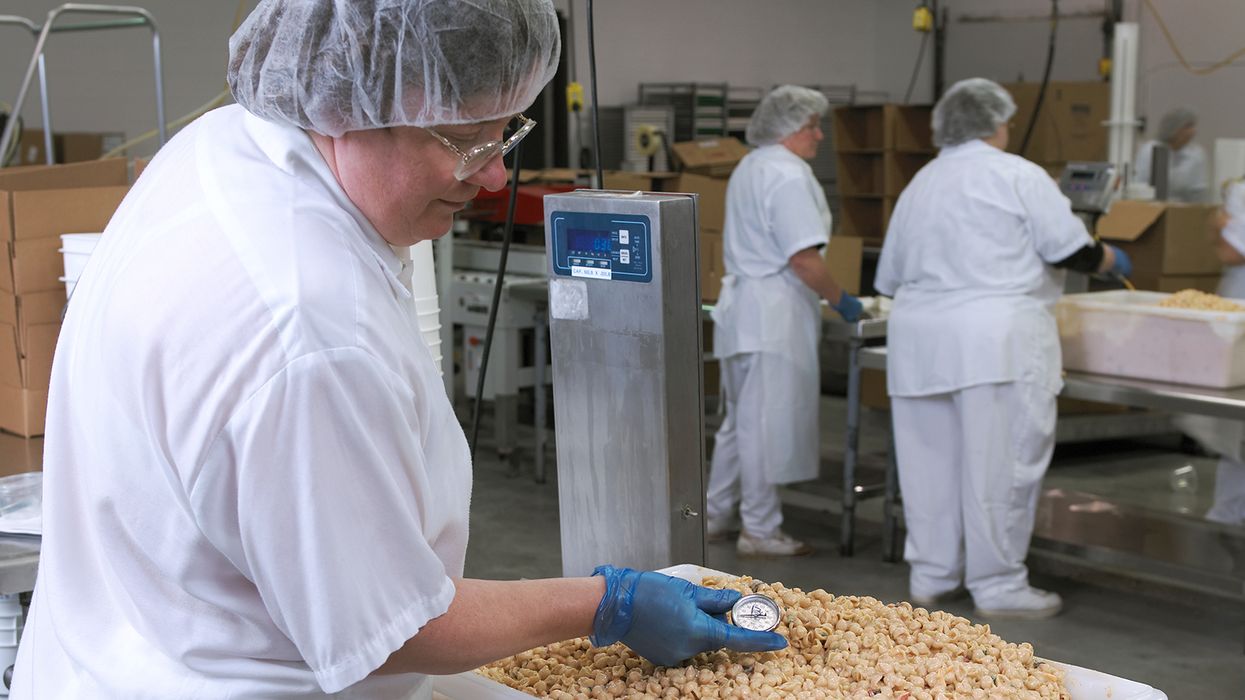Food safety training requirements table


| FDA & USDA: Good Manufacturing Practices (GMPs) (21 CFR 110) | |
| Who: | Food handlers and supervisors |
| What: | • Employees must know their responsibilities and understand the importance of following established procedures so as to minimize the likelihood of food contamination. • Personnel responsible for identifying sanitation failures or food contamination must have a background of education and/or experience that provides a level of competency necessary for the production of clean and safe food. • Food handlers and supervisors must be trained on proper food handling techniques, food-protection principles, and the dangers of poor personal hygiene and insanitary practices. |
| When: | Prior to assignment. Retraining should occur when conditions or hazards in the workplace change, with refresher training every two to three years. |
| What records: | None specified |
| FDA & USDA: Hazard Analysis and Critical Control Point (HACCP) (9 CFR 417) | |
| Who: | • At least one member of the HACCP team (internal or external) must be trained in HACCP. • All employees must be trained prior to beginning employment to use the approved HACCP. |
| What: | • Training should provide an overview of HACCP’s prevention policy, while focusing on the specifics of the employee’s normal functions. • Training must include the identification of food safety procedures, processes that are critical control points, how processes will be monitored, and what corrective actions must be taken when standards are non-compliant or violated. |
| When: | Prior to assignment. Training needs should be re-evaluated whenever there’s a change in a product or food operation. |
| What records: | None specified |
| FDA & USDA: Food Safety Modernization Act (FSMA) | |
| Who: | Companies covered by the Act with personnel assigned to vulnerable areas. |
| What: | Training must cover the employer’s food defense plan. |
| When: | Prior to initial assignment and when changes are made to the plan. |
| What records: | None specified for training. |
| FDA & USDA: Workplace safety (29 CFR 1910) | |
| Who: | Food handlers and supervisors |
| What: | OSHA regulations such as lockout/tagout, machine guarding, personal protective equipment (PPE), hazard communication, and hearing protection may apply. See our table of Required General Industry OSHA Training for applicability. |
| When: | Prior to initial assignment. Annual and/or refresher training may apply depending upon topic. See our table of Required General Industry OSHA Training for applicability. |
| What records: | Dependent upon training topic. See our table of Required General Industry OSHA Training for applicability. |
| FDA: Cleaning and sanitation procedures (21 CFR Part 120, Section 120.6) | |
| Who: | Food handlers and supervisors |
| What: | Training must address the employer’s sanitation standard operating procedure (SSOP) for sanitation conditions and practices before, during, and after food processing. |
| When: | Prior to assignment. Training needs should be re-evaluated whenever there’s a change in a product or food operation. |
| What records: | Training records are subject to the requirements of 21 CFR 120.12 |
| USDA: Cleaning, sanitation, and employee hygiene (9 CFR Part 416) | |
| Who: | All persons working in contact with product, food-contact surfaces, and product-packaging materials. |
| What: | Training should address the employer’s sanitation standard operating procedures (SSOPs) for sanitation conditions and practices before, during, and after food processing; and cleaning food contact surfaces of facilities, equipment, and utensils. Employee hygiene requirements also must be addressed [§416.5]. |
| When: | Prior to assignment. Training needs should be re-evaluated whenever there’s a change in a product or food operation. |
| What records: | None specified |
| USDA: National Organic Program (7 CFR Part 205) | |
| Who: | • Employees whose responsibilities involve organic production or handling. • Certification reviewers and inspectors have specific training requirements under 7 CFR 205.501. |
| What: | Training must be in accordance with the employer’s internal control system. |
| When: | Prior to initial assignment. Training needs should be re-evaluated whenever there’s a change in a product or food operation. |
| What records: | • Certifying agents must maintain current training requirements, training procedures, and training records for all inspectors and certification review personnel. • No record requirements specified for other personnel involved in organic production or handling. |
| USDA: Food ingredients and sources of radiation (9 CFR Part 424, Subpart C) | |
| Who: | Key irradiation personnel who monitor or control daily operations. |
| What: | Training must include food technology, irradiation processing, and radiation health and safety. |
| When: | Prior to initial assignment. |
| What records: | Certification that key irradiation personnel have been trained in food technology, irradiation processing, and radiation health and safety. |
